Week One:
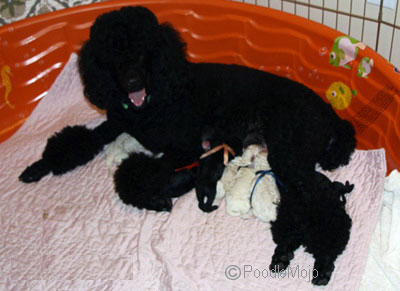
During the first week puppies spend 90% of their time sleeping and 10% eating. Their body temperature at birth is around 94 – 97 degrees. They are not able to regulate their own body temperature so they depend on their mother for warmth. They also cannot see or hear or eliminate on their own. They cannot walk. About all they can do is smell, suckle and crawl.
They are totally dependent on their mother and the environment the first 2 to 3 weeks.They are mostly influenced by their mother and litter-mates during this period. During this week a puppy may lose up to 10% of their weight after birth, which is normal, but then they will start to regain this weight so that by the end of the 1st week they will double or almost double their weight. We weigh the puppies everyday the first 2 to 3 weeks.
Week Two: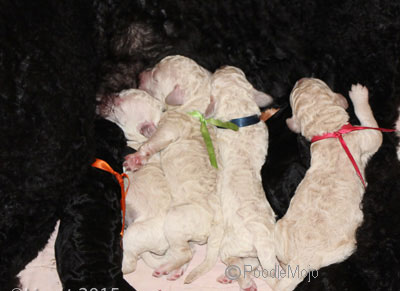
Poodle Puppies usually open their eyes around 8 to 10 days and their ears around 13 to 17 days. While sleeping all healthy and contented puppies will twitch. This is an activated sleep, characterized by muscle twitches. This is normal and healthy.
Week Three:
During the third week we will often see
teeth start to erupt and the puppies will start to stand and walk around. Everyday is amazing to see these helpless puppies start to become independent. At this age their nervous system is more developed so that they can urinate and defecate by themselves.
This is when the puppies will also start to play a little bit more with their litter-mates. This week is very important in the puppies emotional development. They will start not only the interaction with their litter-mates but also with their mother. We never start the weaning process during this week. While mother may come out of the whelping box during this week she will never be far.
Week Four:
At this age the puppies will be introduced to our own homemade puppy mush and their supplement which will help grow their immune systems. (Puppies are born without an immune system and depends on their mother to supply this protection through her milk.) Their body temperature will usually be around 100 degree and they will be able to begin regulating their own body temperature. They still, however, depend on each other for warmth and emotional security and thus will still ‘pile up’.
Every day they will eat more and more. The puppies will start to eat more food and move around more easily. They may even start to chase each other, bark, and bite.
We still weigh them at least every other day if not every day. This is the time that the mother starts leaving the puppies at longer intervals of time and start to regulate their nursing. So this is a good time for us to introduce the puppies to the weaning box and start the weaning and potty box training.
Week Five: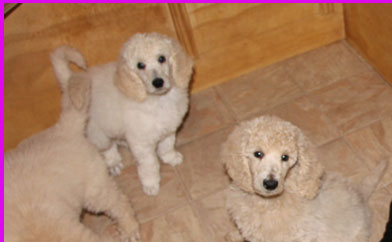
Puppies start to establish some sort of dominance in the pack. Growth and development is rapid in this week. They become very aware of their surroundings and respond quickly to training. They begin to growl, play, challenge, and learn disciple from their mother. They also develop a bit of a competitive spirit. Training ability is developed and puppies are ready to begin learning.
They also start to discover their toys
and play with them more. Keeping them stimulated is important. By the fifth and sixth week all the puppy’s teeth are in (also known as milk teeth). Puppies can start to control their need to potty and now know they need to move away from the sleeping area. Good experience with people from week 5 – 7 will play a large roll in how they will continue to interact.
Week Six:
By this time it is amazing to see that little puppy wake up and walk over to the potty box to eliminate. Puppies enter their socialization period by the end of the third week. However, the most critical period — age six to eight weeks — is when puppies most easily learn to accept others as part of their family (pack). The integrating of the human family is so important and will effect them for the rest of their life.
Week Seven & Eight: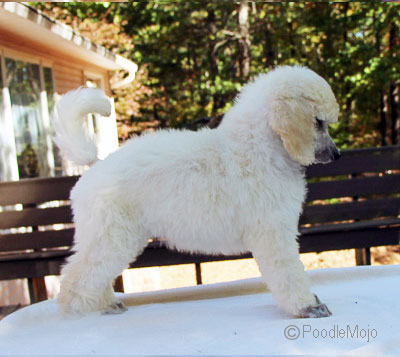
Each day the puppies grow more aware of their surroundings and start enjoying their playtime. The environmental stimulation impacts the puppy’s rate to mental development during weeks five through seven. The puppy brain waves look of an adult dog by about the 50th day, but he is not yet programmed – that is the job of the human trainer, and the job of his mom, siblings and other canine family members. This is when the fun begins for all humans and puppies. We know how important this time is for puppy to adjust to humans and how playtime stimulates their little brains to grow smart and wise.
We introduce them to the outside. We bring in more interactive toys. We introduce them to the pool, weather permitting. If outside pool is out we use the grooming bath for water play. Even though it is important for puppies to interact with humans during this period it is still very important for puppies to be with mother, ‘aunties and uncles’ (other canines) and their litter-mates to learn inhibited play biting and other canine socialization skills. They also learn not to bite the human hand ever! It is at the 7th week, day 49, that we conduct the Volhard Test.
Weeks Eight – Twelve:
Weeks 8 to 10 the puppies will
go through a normal “fear” period. This is actual one of several that will occur through its life. These ‘fear’ periods can be helped with training that is both positive and encouraging. Instead of meeting new or familiar people and objects with curiosity puppies start to react with fearfulness. Anything that frightens them at this age may have a lasting impact. So take care that the baby is not overstimulated with to many changes or challenges at one time. This does not mean that your puppy will grow up to be a scared-y-cat; it is simply a normal part of development where puppies learn to be more cautious. Careful socialization during this period helps counter fear reactions.
Very important to remember: the true training, which is sometimes referred to as the ‘golden time’ is 9 – 12 weeks starts. Why? Because your puppy is actively working on social skills and is paying attention to both litter-mates and humans. Your puppy is learning at an extremely fast rate. This is why we will NOT hold any puppy beyond the 9th weeks. All puppies that cannot be picked up during puppy pickup week must enter their puppy into a training program. NO EXCEPTIONS!
Weeks Thirteen – Sixteen: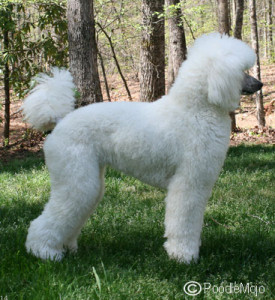
During this phase a puppy will attempt to challenge you for dominance. Here is where they test to see just how much they can get away with and test your level of tolerance. The more a puppy is allowed to get way with during this phase, may cause the dog to lose more and more respect for his owner.
This may result in behavioral issues that can snowball if not corrected through training and obedience. Formal obedience should begin here. This will assist the dog in becoming the best he can be. This is the time your puppy will begin to understand and use ranking in terms of submission and dominance. Are you the owner going to be a good pack leader?
Teething and jumping is all part of puppy play, however, the puppy needs to learn that this is not part of human/puppy play. Puppies will need to be taught what they can and cannot chew. Puppies need to be taught that it is never acceptable behavior to jump on a human, small or big.
At 16 weeks or 4 months your puppy will go through another ‘fear’ stage.
This is the time that the pack leader, the human in charge, especially needs to be confident, but firm with positive reinforcement. An obedient dog, a good canine citizen, is a pleasure to be with. A disobedient dog causes stress for all and can cause damage to things and other humans.
I must make a statement here: There is no such thing as a BAD dog (A dog is an animal doing what dogs do) only BAD humans. What do I mean by that? The canine depends on a human, however, he is and his thinking is canine. He needs the human to communicate and set the standards for him. If the human does not then the dog will have no choice but set his own standards, doggy style. Be prepared to be a Good, very good, pack leader!
Months 5 & 6:
If your puppy has been train correctly you will be sailing along thinking that you have it ‘made in the shade’.
Months 6 – 18:
While you may think of months 3 to 6 as being the ‘elementary school age’, you should think of the 6 – 18 months as the ‘adolescence age’. Your puppy now understands that he has a pack (which may consist of both humans and canine) and his behavior will be most influenced by this group. You can expect your dog to challenge you more as he explores dominance and his role in the pack. Some individuals see a ‘teenage rebellion’ but actually dogs do not want to ‘get back at you’ or do things ‘in spite’. Rather they are just working out what their rank is in the pack and what is expected of them in their position. Again: be a Good, very good, pack leader!
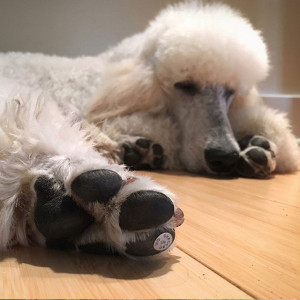 Between 7 & 9 months there will usually be a second chewing stage.
Between 7 & 9 months there will usually be a second chewing stage.
Canines that are not spayed or neutered will also start exhibiting sexual behavior during this period. Be responsible and spay or neuter you canine.
We at Poodle Mojo encourage new owners to have the puppy’s training program well in mind. Some puppy owners hire a canine trainer to come to their home to teach them how to train. Some owners learn ahead of time what they need to do and immediately begin their puppy on this program. Still others have their puppy enter into our training program. Whatever you choose make sure you choose BEFORE the puppy comes home. We have much information on the website about training. And for our puppy buyer we are here whenever they need any coaching along the way.
REMEMBER: A Good Canine Trainer has a Routine and is Consistent with this routine and Persist at the routine.
Be Consistent, Persistent and always have a Routine!
